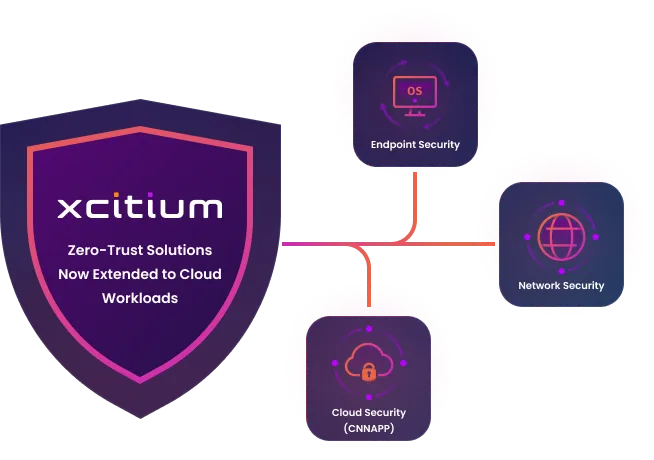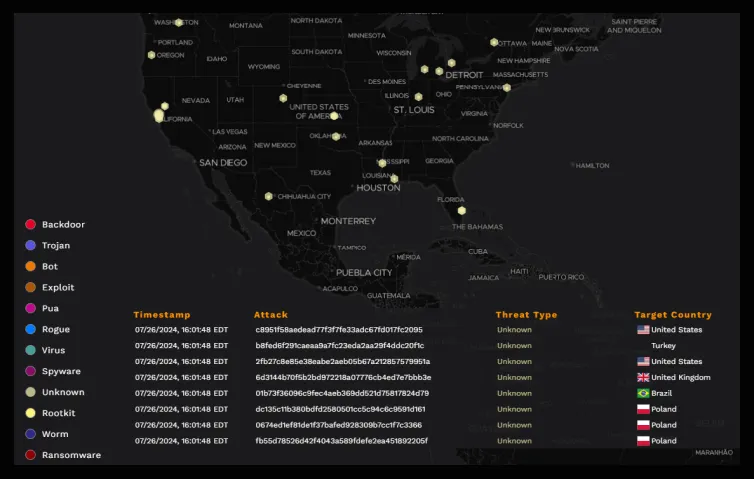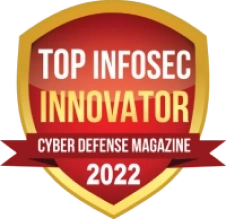Xcitium Platform Featured Packages
Xcitium Managed delivers 24/7 expert-led threat detection and response, combining advanced EDR, proactive threat hunting, and Zero Trust Containment. This package provides comprehensive endpoint protection, ensuring seamless security for organizations without an in-house SOC.
Request Demo- Xcitium Managed delivers 24/7 expert-led threat detection and response, providing comprehensive protection for endpoints and networks.
- Helps organizations strengthen their security posture with proactive hunting, incident remediation, and full visibility into potential threats.
Xcitium Complete is a fully integrated solution offering advanced protection across endpoints, networks, and cloud environments. With cross-layered detection and seamless management tools, this package delivers comprehensive, unified security to stop breaches before they happen.
Request Demo- Xcitium Complete offers full-spectrum protection with cross-layered detection across endpoints, networks, and the cloud.
- Helps to unify your security infrastructure, ensuring seamless, end-to-end defense against modern cyber threats.
Offering feature-rich, autonomous security that harnesses the power of data and AI across the enterprise.
| Xcitium Essentials |
Xcitium Pro |
Xcitium Enterprise |
Xcitium Guided |
Xcitium Managed |
Xcitium Complete |
|
|---|---|---|---|---|---|---|
| Get a demo | Get a demo | Get a demo | Get a demo | Get a demo | Get a demo | |
| Platform Technology Stack | ||||||
| NGAV (1st Tech Stack on Endpoint) Next-Generation Antivirus leveraging AI and behavioral analysis to detect and prevent sophisticated threats. |
||||||
| EDR (2nd Tech Stack on Endpoint) Endpoint Detection and Response tools for monitoring, investigating, and responding to endpoint threats. |
||||||
| Zero Trust (3rd Tech Stack on Endpoint) Proactively neutralize unknown threats by virtualizing their attack vectors, effectively preventing damage from emerging and undetected threats. Patented Zero Trust Containment technology worth $99.00/ep. |
||||||
| SIEM (Security Information & Event Management) Aggregates and analyzes security data across an organization for real-time threat detection and response. |
||||||
| ITSM (4th Tech Stack on Endpoint) Tools and processes for managing IT services, incident response, and integration with security workflows. |
||||||
| Platform Capabilities | ||||||
| Tri-Detection vs Uni-Detection Tri-detection employs multiple methods (e.g., static, behavioral, and AI), compared to a single-detection approach. |
||||||
| Integrated AI/ML Threat Intel & Indicators Uses AI/ML to analyze threat intelligence and provide actionable insights for early threat detection. |
||||||
| NGAV Static & Behavioral AI Threat Prevention Combines traditional static analysis with behavioral AI to identify and prevent known and emerging threats. |
||||||
| Data Loss Prevention & Remediation Prevents sensitive data exfiltration and provides automated remediation strategies to reduce data breaches. |
||||||
| (HIPS) Host Intrusion Prevention System Protects individual hosts by identifying and blocking potential intrusions at the host level. |
||||||
| Award-winning Firewall Control Advanced firewall capabilities to monitor and control incoming and outgoing network traffic effectively. |
||||||
| Attack Surface Reduction Identifies and minimizes entry points for attackers, reducing overall exposure to threats. |
||||||
| Viruscope Monitors application behavior to detect and block malicious activity in real time. |
||||||
| EDR Detection | ||||||
| Interprocess Memory Access Monitors and detects unauthorized or suspicious access between processes to prevent malicious exploitation. |
||||||
| Windows/WinEvent Hook Tracks hooks into Windows events, often used by attackers to monitor or manipulate system behavior. |
||||||
| Device Driver Installations Detects installation of potentially malicious or unauthorized drivers to protect system integrity. |
||||||
| File Access/Modification/Deletion Monitors changes to files for signs of tampering, unauthorized access, or data exfiltration attempts. |
||||||
| Registry Access/Modification/Deletion Tracks interactions with the Windows Registry to identify unauthorized changes or potential persistence mechanisms. |
||||||
| Network Connection Observes outgoing and incoming network traffic to identify malicious connections or data exfiltration. |
||||||
| URL Monitoring Tracks access to URLs to detect phishing, malware downloads, or command-and-control (C2) communication. |
||||||
| DNS Monitoring Monitors DNS queries to detect suspicious or anomalous domain resolution activity linked to attacks. |
||||||
| Process Creation Tracks the creation of processes to identify unauthorized or suspicious execution patterns. |
||||||
| Thread Creation Monitors thread-level activity for malicious behavior, such as injected or rogue threads. |
||||||
| Inter-Process Communication (Named Pipes, etc) Observes inter-process communications like named pipes to detect covert data sharing or control signals. |
||||||
| Telemetry data itself can be extended in real time Enables real-time expansion of telemetry data for deeper insights and rapid response to emerging threats. |
||||||
| Event chaining and enrichment on the endpoints Correlates and enriches security events directly on endpoints for contextualized threat detection and response. |
||||||
| EDR Investigation | ||||||
| Adaptive Event Modeling Dynamically models events to identify anomalous patterns and detect evolving threats. |
||||||
| Behavioral Analysis Examines active memory, OS activity, user behavior, and application processes for signs of malicious behavior. |
||||||
| Static Analysis of Files Analyzes files using machine learning to detect threats, excluding traditional signature-based methods. |
||||||
| Time-Series Analysis Evaluates data over time to identify trends, anomalies, and patterns related to potential security events. |
||||||
| Integration with Automated Malware Analysis Connects with sandboxing solutions to analyze malware in isolated environments and enhance investigations. |
||||||
| Threat Hunting Interface or API Provides tools like YARA, REGEX, ElasticSearch, and IOC search capabilities for advanced threat hunting. |
||||||
| Support for Matching Against Private IOC Allows comparison of observed data with private Indicators of Compromise (IOC) for tailored threat detection. |
||||||
| Threat Intelligence Integration Insights and visibility into cyber threats and vulnerabilities |
||||||
| Linking Telemetry to Recreate Events Connects observable data to reconstruct the sequence of events for detailed investigations. |
||||||
| Process/Attack Visualization Visualizes attack paths and processes to simplify analysis and understanding of threats. |
||||||
| Alert Prioritization Based on Confidence Ranks alerts by confidence level and allows threshold settings to avoid noise and improve response accuracy. |
||||||
| Alert Prioritization Factors System Criticality Considers the criticality of affected systems when prioritizing alerts for response. |
||||||
| Risk Exposure Monitoring Tracks risks across the environment and organizes them by logical asset groups for targeted action. |
||||||
| Reporting on Frequent Alerts for Automation Identifies repetitive alerts suitable for automated responses to reduce manual workload. |
||||||
| EDR Remediation | ||||||
| Remote Scripting Capabilities Enables administrators to execute scripts remotely for remediation and system management. |
||||||
| Quarantine and Removal of Files Isolates malicious files and removes them to prevent further infection or propagation. |
||||||
| Kill Processes Remotely Terminates malicious or unauthorized processes on endpoints from a centralized location. |
||||||
| File Retrieval Allows secure retrieval of files from endpoints for forensic analysis or investigation. |
||||||
| Network Isolation Segregates compromised endpoints from the network to contain threats and prevent spread. |
||||||
| Filesystem Snapshotting Captures the state of the file system for analysis or rollback during remediation efforts. |
||||||
| Memory Snapshotting Takes snapshots of active memory for forensic analysis of in-memory attacks or anomalies. |
||||||
| Services | ||||||
| (CTRL) Xcitium Threat Research Labs Service Offers access to expert threat researchers for advanced analysis and threat intelligence. |
||||||
| Automation Scripting Service Provides custom automation solutions to streamline and accelerate security operations. |
||||||
| Baseling Pro Service Assists in creating system baselines for normal behavior to enhance anomaly detection. |
||||||
| Cyber Transparency Service Delivers insights and visibility into cyber threats and vulnerabilities affecting the organization. |
||||||
| Endpoint Compliancy & Management | ||||||
| Patch Management Automates the deployment of software updates and patches to reduce vulnerabilities. |
||||||
| Vulnerability Reporting Identifies and reports on unpatched vulnerabilities, such as those tied to CVEs, to reduce risk exposure. |
||||||
| Xcitium Custom Security Policies Enables creation of tailored security policies to address unique organizational needs. |
||||||
| Device Asset Discovery Identifies and inventories all devices within the network to enhance visibility. |
||||||
| Remote Monitoring and Management Provides centralized monitoring and control of endpoints for proactive management. |
||||||
| Vulnerability Scanning Scans systems to identify and report on vulnerabilities that could be exploited. |
||||||
| Device Enrollment Simplifies onboarding of devices into security and management systems. |
||||||
| Incident Log Activity Tracks and records security incidents for auditing and investigative purposes. |
||||||
| Application Control Manages and restricts application usage to prevent unauthorized or risky software. |
||||||
| External Device Control Restricts access and usage of external devices like USB drives to prevent data loss. |
||||||
| Compliance Reporting Generates reports to demonstrate adherence to security and regulatory requirements. |
||||||
| Hosted Ticketing Provides a centralized ticketing system for managing security-related tasks and issues. |
||||||
| Additional Log Retention Extends storage of log data for analysis, compliance, and forensic needs. |
||||||
| Managed Detection & Response | ||||||
| Detection and Monitoring | ||||||
| 24/7 Security Operations Center (SOC) Round-the-clock monitoring, analysis, and threat response by security experts. |
||||||
| Network Traffic Analysis (NTA) Monitors network traffic to detect anomalies or malicious activity patterns. |
||||||
| User Behavior Analytics (UBA) Analyzes user activity to identify suspicious or unusual behavior. |
||||||
| Log Management and Analysis Centralized collection and detailed analysis of system logs for threat detection. |
||||||
| Cloud Security Monitoring Specialized monitoring for cloud platforms like AWS, Azure, and Google Cloud. |
||||||
| Insider Threat Detection Identifies malicious activities initiated by employees or other internal actors. |
||||||
| Threat Intelligence | ||||||
| Threat Feed Integration Provides real-time updates on vulnerabilities, exploits, and attack trends. |
||||||
| Adversary TTPs Maps and identifies attacker behaviors using frameworks like MITRE ATT&CK. |
||||||
| Dark Web Monitoring Tracks compromised credentials or threats targeting the organization on the dark web. |
||||||
| Threat Hunting | ||||||
| Proactive Threat Analysis Actively explores data to identify hidden or advanced threats. |
||||||
| Anomaly Detection Detects unusual activity patterns that automated systems might miss. |
||||||
| Incident Response | ||||||
| Automated Incident Containment Blocks malicious activity automatically to contain threats. |
||||||
| Incident Triage and Prioritization Assesses and prioritizes incidents based on their risk and impact. |
||||||
| Post-Incident Forensics Investigates incidents to determine their root cause and scope. |
||||||
| Remote Incident Containment Isolates compromised devices and threats without requiring on-site access. |
||||||
| Attack Surface Reduction Provides recommendations to minimize vulnerability to future attacks. |
||||||
| Vulnerability Management | ||||||
| Regular Vulnerability Scans Periodic scans to identify and report on system weaknesses. |
||||||
| Patch Management Recommendations Prioritizes updates to address critical vulnerabilities. |
||||||
| Compliance Support | ||||||
| Regulatory Compliance Assistance Guidance for adhering to frameworks like GDPR, HIPAA, PCI DSS, and SOC 2. |
||||||
| Audit-Ready Reports Provides documentation to support compliance audits. |
||||||
| Security Policy Development Helps create and maintain effective cybersecurity policies. |
||||||
| Reporting and Insights | ||||||
| Customizable Dashboards Real-time security status and incident visibility through tailored dashboards. |
||||||
| Executive-Level Reporting Summarized insights tailored for board or executive presentations. |
||||||
| Detailed Root Cause Analysis Explains how and why incidents occurred for better future prevention. |
||||||
| Key Performance Indicators (KPIs) Provides metrics to measure and improve security posture. |
||||||
| Advanced Capabilities | ||||||
| AI and Machine Learning Enhances detection and response through advanced analytics. |
||||||
| Cloud Sandbox Augments ZeroDwell Technology |
||||||
| Zero Trust Architecture Support Implements Zero Trust principles for better access control and security. |
||||||
| Cross-Platform Protection Covers on-premises, cloud, and hybrid environments for comprehensive security. |
||||||
| Advanced Customer Support | ||||||
| 7x24 Advanced Customer Support Around-the-clock support for critical and non-critical issues. |
||||||
| Dedicated Account Management Provides a single point of contact for support and guidance. |
||||||
| Flexible Service Plans Tailored MDR packages to meet organizational needs. |
||||||
| Scalable Solutions Easily adjusts to accommodate growth or changes in the organization. |
||||||
| Platform SLA | ||||||
| 5x9 Customer Support Provides support during standard business hours. |
||||||
| 7x24 Advanced Customer Support Offers continuous support for critical security operations. |
||||||
| MDR SLA | ||||||
| Detection and Response | ||||||
| Threat Detection 95% of threats detected within 10 minutes of occurrence. |
||||||
| Incident Triage High-priority alerts triaged and escalated within 15 minutes of detection. |
||||||
| Threat Containment Active threats contained instantly with ZeroTrust Containment Technology. |
||||||
| Mean Time to Response (MTTR) Average response time of 30 minutes for critical incidents. |
||||||
| Monitoring and Availability | ||||||
| SOC Availability Security Operations Center (SOC) available 24/7/365. |
||||||
| Platform Uptime 99.9% uptime guarantee for the MDR management portal. |
||||||
| Log Availability Real-time log ingestion and availability with a latency of no more than 5 seconds. |
||||||
| Reporting and Insights | ||||||
| Post-Incident Reporting Detailed forensic reports provided within 24 hours of incident resolution. |
||||||
| Compliance Reporting Monthly compliance reports delivered within the first 5 business days of the month. |
||||||
| Dashboard Updates Threat dashboards updated every 5 minutes with the latest detections. |
||||||
| Proactive Services | ||||||
| Vulnerability Scans Quarterly scans conducted to identify and prioritize vulnerabilities. |
||||||
| Proactive Threat Hunting Weekly dedicated threat-hunting activities to detect hidden threats. |
||||||
| Penetration Testing Annual penetration testing included to simulate real-world attacks and test defenses. |
||||||
| Customer Support | ||||||
| Response Time for Support Requests Support tickets acknowledged within 15 minutes for critical issues. |
||||||
| Issue Resolution Time Operational issues resolved within 4 hours for standard cases, 1 hour for critical cases. |
||||||
| Dedicated Account Manager Non-critical queries receive a response within 24 hours. |
||||||
| Data Protection | ||||||
| Data Encryption Ensures 100% encryption of data at rest and in transit. |
||||||
| Data Retention 30 days by default, customization options are available. |
||||||
| Breach Notification Customers notified of suspected data breaches within 4 hours of discovery. |
||||||
| Performance Metrics | ||||||
| False Positive Rate 0% false positive in escalated alerts. |
||||||
| Mean Time to Detect (MTTD) Incidents detected in 0 seconds with Zero Trust Containment technology. |
||||||
| Incident Success Rate 100% of incidents successfully contained and remediated. |
||||||
| Custom SLAs | ||||||
| Critical Applications Critical business applications monitored with a 5-minute SLA for threat detection. |
||||||
| Industry-Specific Compliance Ensures compliance with industry standards such as HIPAA, PCI DSS, or GDPR. |
||||||
| Add-Ons (*can be purchased seperately) | ||||||
| DNS and Web Filtering Blocks access to malicious websites. |
+ | + | + | + | + | + |
| Email Security Monitoring Protects email systems from phishing and spam attacks. |
+ | + | + | + | + | + |
Zero-Trust from Endpoints to Cloud Workloads
We implement a robust zero trust model that spans from endpoints to cloud workloads, ensuring comprehensive security across your entire digital infrastructure. Our patented auto containment technology plays a crucial role in this strategy. By isolating and examining any suspicious activity in real-time, ZeroDwell Containment prevents potential threats from causing harm, regardless of their origin or destination within your network.

System
Management
Management
The Xcitium Difference:
Handling Unknowns
- The EPP/EDR industry is detection-based, ignoring unknowns (zero-day threats)
- Xcitium is the only vendor capable of detecting both knowns and unknowns
- Patented virtualization containment technology eliminates damage from zero-day threats

Benefits
Solution
Why Choose Xcitium?
Xcitium exists to ensure that people can embrace technology fully, without the shadow of insecurity hanging over them. We’re here to give users the freedom to explore, create, and connect without fear. Whether it’s preventing unknown files from compromising systems or offering innovative approaches to endpoint protection, Xcitium’s technology is designed to foster confidence. We believe that by keeping the digital ecosystem secure, we’re directly contributing to human evolution—by enabling people to take full advantage of the tools that define our era.





